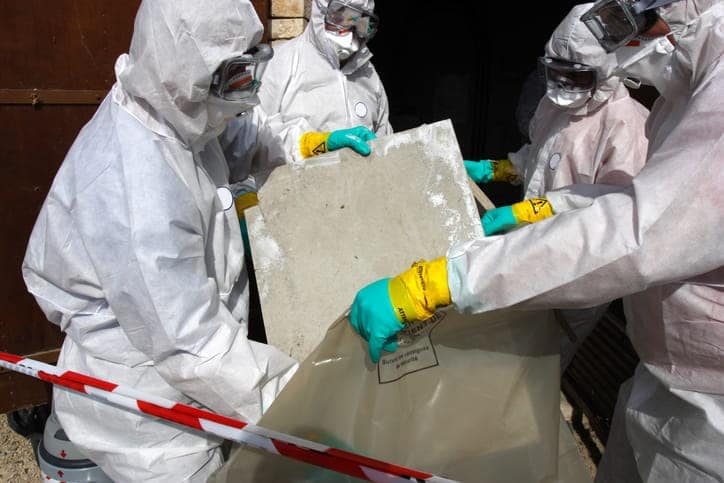Can I Sue My Landlord for Asbestos Exposure?
If you are a renter in Miami, Florida, and were unknowingly exposed to asbestos, you may be able to take legal action and hold your landlord responsible for your asbestos-related illness.

As with most personal injury lawsuits, asbestos-related injuries, including mesothelioma cases, are usually resolved through settlement, with only a fraction ever going to trial. Industry leaders say the average asbestos-related settlement ranges from $1 million to $1.4 million.
Navigating life after you have received a diagnosis of an asbestos-related injury can be scary and feel overwhelming. Seeking legal guidance can be one of the best ways to hold a landlord accountable for their actions.
NO FEES UNLESS WE WIN
Protecting Your Rights Since 1983
At the law offices of Bernstein & Maryanoff, we help asbestos exposure victims just like you recover compensation for their injuries. Our legal team can help you understand your rights as a tenant and will take the appropriate legal action against a landlord or other liable parties if you’ve developed an asbestos-related illness.
Hablamos Español
Asbestos in construction
Asbestos is a naturally occurring mineral made up of long and thin fibrous crystals. These strong fibers are naturally heat and chemical-resistant, making asbestos a perfect additive in residential building materials.
Before the days of government regulation and before the harmful side effects of asbestos exposure were known, this fibrous mineral could be found in building insulation, roof shingles, ceiling and floor tiles, and other common household building materials.
The issue with asbestos occurs when the fibrous mineral is released into the air after the asbestos-containing material has been disturbed. This usually happens during a home renovation or when a maintenance or service repair is done on a part of the home where asbestos is present. Once these fibrous materials become airborne, they can be inhaled by an unsuspecting tenant. Repeated inhalation over a long period of time can cause health complications.
The Clean Air Act of 1970, enacted by the Environmental Protection Agency (EPA), established that using asbestos in new construction is banned. Today, asbestos is only allowed in select construction materials intended for commercial and industrial use.
Dangers of asbestos
The major health issue stemming from asbestos exposure is the development of lung disease. If an individual smokes, the risk is made worse. In addition to lung cancer, repeated asbestos exposure can result in mesothelioma. This is a rare type of cancer that presents itself in the lining of the lungs, chest, and heart.
Finally, repeated exposure to asbestos can result in a serious and progressive long-term disease known as asbestosis, a non-cancerous disease affecting the lungs.
Asbestos exposure is especially harmful because it can take years before symptoms become present. Additionally, when these symptoms do pop up, they can be difficult to diagnose. As such, it can be difficult to identify asbestos-related health ailments.
Common symptoms associated with asbestos exposure can include:
- Shortness of breath
- A stubborn dry cough that won’t go away
- Tightness in the chest and/or chest pain
- A loss of appetite that results in sudden weight loss
- Cracking or popping sound in the lungs when breathing in
- Fingertips that are rounded or wider (clubbed) due to asbestos fibers causing calluses or skin corns
Florida’s laws regarding asbestos
There are both federal and state laws regulating asbestos and how it should be handled. On the federal level, the Occupational Safety and Health Administration (OSHA) and the EPA set guidelines through laws, including OSHA’s Asbestos standards for the construction industry and the EPA’s Asbestos School Hazard Abatement Reauthorization Act.
OSHA outlines asbestos-related laws that employers and landlords must follow when hiring employees to work on a rental property with asbestos. If a landlord does not follow these laws, they could be liable for negligence.
How landlords are required to follow these laws also depends on the type of work being done in the rental unit. For example, if a cleaning crew is hired to clean floors contaminated with asbestos, a landlord may only have to provide the cleaning crew with asbestos safety training.
If the job is bigger, such as renovating an asbestos-infected unit, the landlord might be required to provide testing, asbestos training, mitigation tactics, and other precautions.
Landlords have a duty to tell tenants who live in the rental unit about any asbestos-related issues in the home.
The Florida Department of Environmental Protection also offers guidelines for building owners and contractors. Depending on the type of maintenance being done to a building, a landlord could be deemed negligent if they violate state law on handling asbestos.
Suing your landlord for asbestos exposure
If you are a tenant who has been exposed to asbestos, you may be able to sue your landlord. However, asbestos exposure alone may not be enough to sue your landlord. Depending on your circumstances, you may need to prove your landlord acted negligently, resulting in a health issue or other losses due to the asbestos exposure.
Here are the three most common claims you can make against a landlord over asbestos exposure.
Breach of rental agreement
A rental agreement should have a clause in it relating to the cleanliness, safety, and good condition of a rental unit. If asbestos is present, this could violate or breach the rental agreement.
Breach of implied warranty of habitability
All 50 states recognize implied warranty of habitability. This notion maintains that a rental unit should be suitable and safe for its intended purpose — being lived in. To make this claim, you will need to show that there is a bad condition that causes the rental to be uninhabitable, that the landlord knew of the dangerous situation, and that you suffered damages as a result.
Negligence
Lastly, if your landlord was negligent in their actions that led to your exposure to asbestos, you may be able to file a claim against them. A successful negligence claim requires the following four elements:
- A landlord has a duty to protect their tenant by taking reasonable measures that exist in a landlord/tenant relationship
- A landlord violated that duty by failing to warn you about the presence of asbestos in your rental unit
- You suffered injuries because of the exposure to asbestos
- You suffered damages, financial losses, and other losses because of the exposure to asbestos
A negligence claim can also fall under a broader legal concept known as premises liability. Under premises liability, landlords have a duty to protect visitors and occupants from dangerous conditions on their property. Often, claims of premises liability come into place when individuals suffer personal injuries, including slips and falls on someone else’s property.
Damages you can pursue if you have been exposed to asbestos
You will be able to seek restitution for financial losses when you file a lawsuit over asbestos exposure with a personal injury attorney. The damages you can seek depend on the type of claims you have made in your lawsuit. Typically, victims of asbestos exposure can seek out damages, including:
- Loss of income and/or lost wages if you have not been able to work because of your asbestos-related injury
- Treatment costs and medical bills
- Travel costs for treatment
- Pain and suffering
- Emotional suffering
- Other calculable and non-calculable losses that resulted from your asbestos exposure
- Rent paid, including a security deposit
Statute of limitations
A statute of limitations is a time period in which a person can take legal action against a defendant. This time period depends on the type of injury you sustain and who you are taking legal action against.
Florida law allows victims of an asbestos-related claim four years to file their lawsuit. The time begins to tick once an individual has been diagnosed with an asbestos-related disease. If a victim does not bring their claim before this four-year time period, they could miss their opportunity to take legal action.
Speak with an asbestos injury lawyer today
If you are a tenant who has been exposed to asbestos and were diagnosed with an asbestos-related illness, you do not have to suffer alone. Florida law recognizes the rights of tenants who have been exposed to asbestos and allows them the opportunity to take legal action.
At the law office of Bernstein & Maryanoff, our team of attorneys, paralegals, and investigators will work diligently to investigate your claims. When you schedule a free case consultation with our team, you’ll have expert legal support to guide you on your next steps. Even if you are unsure whether you have a case, our team can determine if your landlord or other parties can be held responsible.

If we do take on your case, you can count on having legal representation that will defend your rights as you seek the restitution you deserve. Our team has worked with victims just like you who live in Miami-Dade County, Broward County, and surrounding areas. Get in touch today to learn how we can serve you.
NO FEES UNLESS WE WIN
Protecting Your Rights Since 1983
Learn more about your rights and legal options by scheduling a free case consultation with the team at Bernstein & Maryanoff
Hablamos Español
Sources:
Asbestos Frequently Asked Questions. (2022).
Asbestos School Hazard Abatement Reauthorization Act (ASHARA) of 1990.
Asbestos Standard for the Construction Industry. (2002).
Clean Air Act: A Summary of the Act and Its Major Requirements. (2022).
About the Author

Jack G. Bernstein, ESQ.
Jack Bernstein is a hard-working and highly motivated personal injury attorney in Miami, Florida with over three decades of experience. He is a strategist and idea person, with a genuine passion for helping his firm’s clients. If you’ve been injured, contact Jack Bernstein today for a free evaluation of your case.
